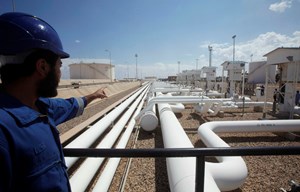Libya’s chief prosecutor orders oil minister’s arrest amid Sharara production pause
(Bloomberg) – Libya’s prosecutor-general ordered the arrest of the country’s oil minister, though it was unclear who currently holds the post in the crucial ministry amid long-running political upheaval in the OPEC member nation.
The unnamed minister and the director of his office were accused of behavior “inconsistent with their job duties,” according to a statement. The move fuels uncertainty in an industry beset by unrest, with oil production frequently hostage to struggles between dueling administrations in Tripoli and the east.
Former Oil Minister Mohamed Oun was suspended for two months earlier this year pending an investigation into alleged violations, and acting minister Khalifa Abdul Sadiq was appointed, before Oun was cleared and returned to his post.
Sadiq has been referred to as the minister in recent ministry releases and last month Oun said he had stopped working after being sidelined by the prime minister. He pressed the government either to allow him to continue in his role or formally dismiss him.
Libyan authorities didn’t immediately answer calls seeking comment on Wednesday.
The defendants allegedly threatened a corporate accountant “to approve a document authorizing the disposal” of about €457 million ($500 million) “for the benefit of a foreign company in violation of legislation,” according to the statement.
Volatile output. Libya holds Africa’s largest oil reserves, but persistent political strife has taken its toll. Production that neared 1.8 MMbpd in 2008 sank to 100,000 bpd following the killing of Moammar Al Qaddafi in 2011.
The oil and gas sector has often been at the heart of divisions between top officials. In 2021, Oun himself attempted to suspend Mustafa Sanalla, the long-standing head of National Oil Corp. Sanalla finally left the post in mid-2022 amid political unrest that sent oil output to less than 700,000 barrels a day.
In the latest disruption to energy infrastructure, Libya’s biggest oil field halted production this week, losing more than 250,000 bpd. The country was producing about 1.2 MMbpd before the shutdown.



